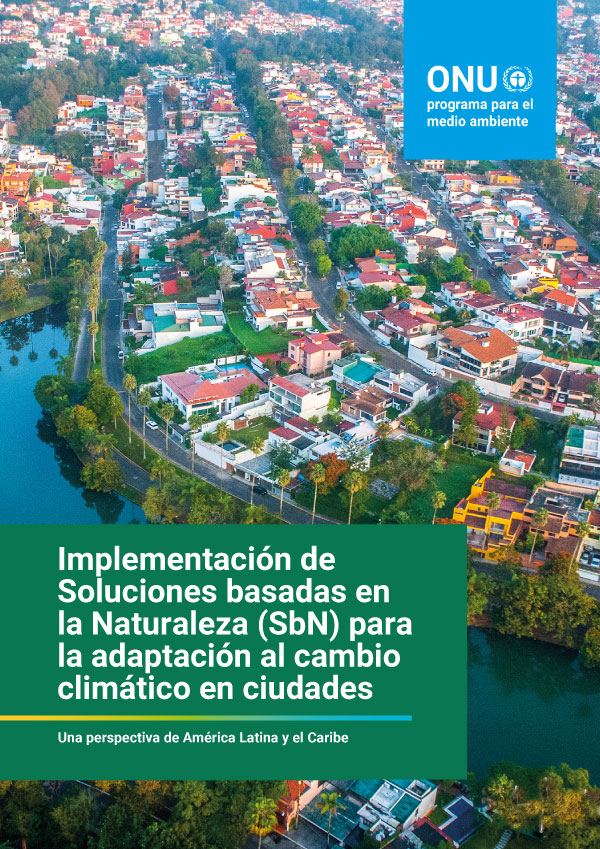Private Sector
The private sector plays a crucial role in the climate adaptation of cities due to its capacity for technological innovation, its experience in the efficient management of resources, its potential for public-private collaboration and its management of sustainable investments. This platform has resources and specific information to facilitate the involvement of the private sector in climate change adaptation processes, whether through the mobilization of resources or the dissemination of knowledge and capacity building.
Here, the private sector will be able to find opportunities for:
Collaboration and synergies
Information on Business Models Based on NbS
Cost benefit of NbS
Direct involvement with the initiative through investments
Belonging to a network of partners focused on climate resilience
This is a space to drive the transformation towards more sustainable, climate resilient cities that are prepared to cope with the impacts of climate change.
Roadmap
Private sector
1
Risk assessment
Evaluate exposure to physical risks and identify impacts on the business.
Vulnerability matrix.
2
Integration
of adaptation
Ensure that senior management supports and promotes adaptation and sets specific goals for adaptation.
3
Operational
resilience
Implements risk management measures and protection of vulnerable infrastructure.
4
Collaboration
and communication
Participate in sectoral or local adaptation initiatives and communicate the measures implemented. Consider especially NbS.
5
Monitoring
and evaluation
Evaluate the efficacy and effectiveness of measures and make decisions based on an impact analysis.
Toolkit
Private sector
Discover the Climate Resilience Toolkit for Companies!
Addressing climate change is an opportunity to lead the way towards sustainability and resilience. This Toolkit offers practical solutions to understand the processes of adaptation to climate change, such as tools to assess vulnerabilities, and initiatives to implement adaptation strategies. This resource can be an essential guide for a climate resilient future in which the private sector plays a leading role.
All of these alternatives drive a real transformation of the economy, towards more sustainable, climate-resilient cities prepared to face the impacts of climate change. Here, you will find tools to align investments with the global climate change adaptation agenda.
Ready for Climate Resilience? Check out the following tools:
The first stage of the Climate Resilience Toolkit focuses on a climate vulnerability assessment, a crucial step in understanding and addressing the specific climate challenges faced by companies in their respective sectors. This is the first step for companies to address the risks associated with climate change in their sector. This assessment involves identifying and analyzing climate risks that could affect the company’s operations, supply chain and productivity.
By understanding the risks they face, companies can manage them efficiently, plan strategically and allocate resources with specific guidance, while focusing on identifying measures to adapt to climate change, ensuring their competitiveness in the medium and long term.
Consultation tools:
The second stage focuses on the identification of adaptation strategies. Here, it is worth mentioning the importance of opting for an approach that encompasses and addresses the risks identified during the first stage. In other words, identifying strategies that reduce the impact according to the identified risks.
To address the specific climate challenges that companies face, it is necessary to focus both on implementing measures at the operational level, as well as promoting collaboration and engagement throughout the entire value chain of each sector. This involves working together with various stakeholders, such as business partners, suppliers and relevant stakeholders to adopt solutions that promote sustainability and climate resilience at all stages of the supply chain.
Consultation tools:
- Simulation of Project risks and externalities in NbS: Try SAVi Demo – Sustainable Asset Valuation (SAVi) (iisd.org)
- Tracking nature across the supply chain – CDP
- Cost-Benefit analysis tool for the implementation of adaptation measures against climate change and/or mitigation of GHG emissions (acbgiz.org)
This stage is essential both to ensure that the adaptation strategies implemented are giving results, and to identify areas for continuous improvement. Establishing key climate performance indicators specific to each sector makes it easier to measure progress in reducing climate risks and strengthening climate resilience.
The implementation of monitoring and evaluation tools not only guarantees informed and data-based decision making, but also allows companies to identify emerging risk areas and anticipate possible climate impacts. This way, companies can optimize their resources and maximize their impact. Furthermore, by communicating their results they promote transparency and open the door to collaborations with other companies and industries.
Setting the example:
Private Sector and Nature-based Solutions for a resilient future

NbS from Mexico:
Companies that have supported Xalapa´s climate resilience
In the CityAdapt framework, which aims to reduce the vulnerability of three cities: Xalapa (Mexico), Kingston (Jamaica), and San Salvador (El Salvador) by the adoption of the Ecosystem-based Adaptation approach (EbA), it was determined that the Mexican city suffers from both water scarcity and flooding due to inadequate water management, and is highly dependent on a watershed from another Mexican state for its water supply. That is why, in addition to funding from the Global Environment Facility (GEF), the city and its key stakeholders organized the implementation of EbA measures:
- Municipal and national funds from the National Water Commission financed the construction of the Fernando Gutiérrez Barrios channel, a grey infrastructure solution (approx. US $2 million)
- Xalapa City Council co-financed rainwater harvesting systems in public buildings (US $92,760)
- The Gonzalo Río Arronte Foundation funded rainwater harvesting in housings (US $100,000)
- A voluntary water fee plan (US $500,000) was established, managed by the Municipal Water and Sanitation Commission, currently without contribution from citizens, but continued by companies that joined the commitment.


